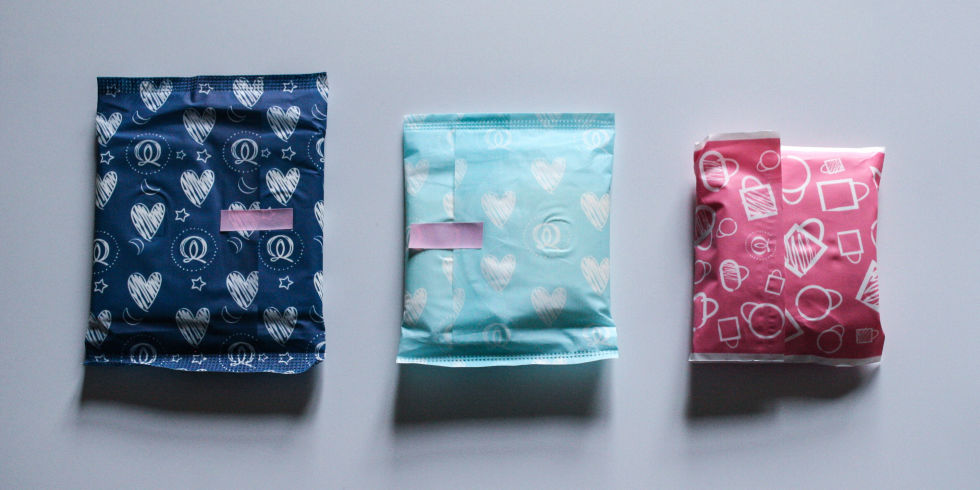As if worrying about getting your period on time wasn’t enough, it turns out it’s not unusual for women to notice a bit of a blood down there at times when they’re not expecting it, too.
There’s a number of reasons that this can happen, some of which will sort themselves out fairly quickly, but others need the attention of your doctor – stat.
We spoke to the research team at Clue to find out what might be going on, and when it’s time to get checked out…
1. You’re experiencing ovulation bleeding
Spotting around the time of ovulation has been estimated to occur in approximately 3% of menstruating people. It’s considered a physiological response to the quick drop in oestrogen just after ovulation, before progesterone has a chance to rise.
So, if you’re in this 3%, the bleeding you’ve noticed is simply a part of your body’s cycle. Although it’s worth consulting an expert to ensure there’s nothing more serious at play, it’s not usually a cause for concern.
2. You’ve started a new contraception
Unscheduled bleeding is a common side effect of hormonal contraception, especially during the first few months of starting a new method. If you’re taking combined oral contraceptives (the most common type of birth control pill), and the spotting continues after the first few months, you may want to try another brand with a different level of oestrogen. Additionally, continued spotting is more common with the hormonal IUD and the mini-pill (a progestin-only pill).
3. You’ve missed pills
At the opposite end of the spectrum, you might also notice bleeding occurring if you’ve forgotten to take your pill altogether. This is because the levels of the pill’s hormones, that you have become used to, will have dropped (this is also why you bleed during your placebo week).
Sidenote: you’re also no longer protected from pregnancy, so be sure to use alternative methods if you’re planning on having sex.
4. You’ve taken emergency contraception
Usually when you’ve taken emergency contraception, you’ll get your period sooner than scheduled, but don’t be surprised to see it show up slightly later. Emergency contraceptives can also cause light spotting (non-menstrual bleeding). People who don’t get their next period around the expected time should check for pregnancy. It is common for the second cycle, and period, to be slightly longer after taking an emergency contraceptive pill.
5. You’re spotting after sex
If you’re bleeding after your first time having sex, or a particularly rough session, don’t freak out – but the Clue team warn that consistently spotting after penetrative vaginal intercourse is not considered normal, and you should talk to your healthcare provider. Spotting after sex (postcoital spotting) is usually caused by an issue with the cervix, like a polyp or lesion. Cervical cancer used to be more common as a reason for post-coital spotting, but rates have fallen sharply due to the rise of screening programmes (smear tests are important!), and HPV vaccinations.
6. You’re pregnant
About one in four people experience bleeding between weeks 5 and 8 of pregnancy, and it may continue at times throughout the first trimester. While this isn’t usually a sign of threat, it’s a good idea to get checked just in case. Research has shown about one in 10 of these episodes is associated with miscarriage, so it could indicate an issue that needs treatment.
Bleeding in early pregnancy could also be a symptom of an ectopic pregnancy. This is a pregnancy that is growing somewhere other than the uterus, usually the fallopian tube. Ectopic pregnancy bleeding is often coupled with other symptoms including abdominal pain on one side, pelvic pain, shoulder pain, and/or dizziness. Seek immediate medical help if you experience symptoms of an ectopic pregnancy.

7. You have fibroids
Fibroids, or the abnormal growth of muscle tissue on your uterus, can be another culprit that causes mysterious bleeding at random times of the month. Some women go through life totally unaware that they even have them, but when they do present symptoms, they include heavy or painful periods, severe abdominal and back pain, and discomfort during sex. Contact your GP if your fibroids need treating – there are medications that can shrink them, and options for surgery if needed.
8. You’re suffering from pelvic inflammatory disease
Pelvic inflammatory disease (PID), which happens when certain pelvic infections (like STIs) go untreated, can also be another culprit for unscheduled spotting. Other symptoms of PID might include pain in the lower abdomen, unusual vaginal discharge, and pain during sex. Sound familiar? Speak with your doctor asap.
9. You have a UTI
Urinary tract infections (UTIs) can cause bleeding from the urethra (where you pee from, between your clitoris and vagina). If you’re finding it painful to go to the toilet, and seeing a small amount of blood on the toilet paper when you go, this could be the reason behind your bleeding. Again, it’s important to seek the advice of a professional.
10. You’ve got uterine or cervical polyps
Simply put, these polyps are abnormal growths on your cervix or the inside of your uterus. As well as unexpected bleeding, they may also cause irregular discharge, although sometimes they can exist without any indication. Polyps are often discovered during a smear test, and the majority of them are benign – but bleeding between periods can be a sign of cancer.












